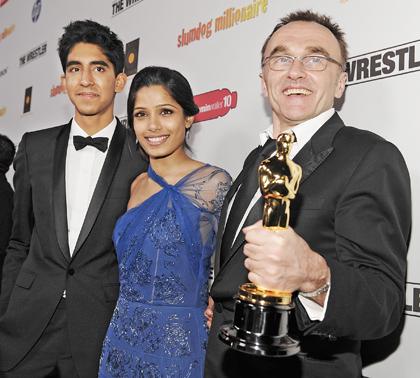By Anna Gustafson
When Rahul Arora, owner of a Jackson Heights bridal store, saw “Slumdog Millionaire” rake in eight Oscars Sunday, the man who grew up in northern India was elated.
“The fact that this movie won Oscars is really good,” Arora said. “It will help people learn more about India. It will make people want to learn more about India.”
Arora was not only thrilled with the film’s victory as Best Picture at the Oscars because he was raised in India, but also because he knows A.R. Rahman, the film’s music director who picked up two Oscars. Before he opened up Armaan’s Bridal, a showroom that is a burst of color and sequins, Arora promoted Bollywood films in America and frequently met Indian movie stars and singers, including Rahman.
Shahan Khan, who works at the dress shop Jessi Emporium in Jackson Heights, also was pleased with the Academy’s decision to honor Rahman.
“I’m Muslim, and he’s Muslim, so that makes me happy,” said Khan, formerly of Bangladesh. “The music is so nice. The movie is very good, and I’m going to see it again with my family — my husband, my kids — this Sunday. We are making a big trip of it and going into Manhattan to see it.”
But not everyone in Jackson Heights, often referred to as Queens’ “Little India,” was pleased with “Slumdog Millionaire,” a movie about the improbable rise of Jamal Malik, an 18−year−old orphan from the slums of Mumbai, to fame and fortune. Malik wins a staggering 20 million rupees — about 578 times the median income in India — on the Indian version of “Who Wants to Be a Millionaire?”
“It’s a very good movie based on hope, but the bad thing is they only showed the Bombay slums,” said Bhavin Patel, who works in a telecommunications booth situated in the A2Z music and film store in Jackson Heights. “They criticize Indian poorness. It’s giving a very particular view that does not show the whole of India.”
Patel also bristled at the fact that the film was directed by an British director, Danny Boyle.
“If this was a movie made by an Indian director, it would never have gotten an Oscar,” Patel said. “Maybe it would’ve gotten a nod in the foreign film category, but it would have never won Best Picture. This got an Oscar because the director was British.”
Sheswat Butala, owner of Butala Emporium, an Indian bookstore, in Jackson Heights, agreed that the movie was not a realistic portrayal of India, nor of the slums.
“I lived in Bombay until 1996, and I have seen the slums,” Butala said. “They are not like what the movie shows. There is not so much hope. There are so many households in such a little area, and they use public services like baths every day.”
“It’s a good movie, but if people think it’s like reality, they are mistaken,” he added.
Still, Indians are proud of the film and its almost entirely Indian cast, including several children from Mumbai’s slums.
“People in India are very, very happy,” said Jackson Heights resident Kelly Singh, whose parents are from Mumbai. “We got so many phone calls from residents who were having parties all night because of the Oscars. People are really excited.”
Reach reporter Anna Gustafson by e−mail at agustafson@timesledger.com or by phone at 718−229−0300, Ext. 174.



































